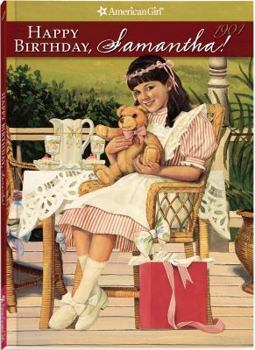Happy Birthday, Samantha!: A Springtime Story
(Book #4 in the American Girl: Samantha Series)
Select Format
Select Condition 
Book Overview
Samantha's birthday is nearly ruined when her neighbor plays a mean trick. But it's rescued by an invitation to visit New York City! American Girls Collection/Samantha #4. This description may be from another edition of this product.
Format:Paperback
Language:English
ISBN:0937295353
ISBN13:9780937295359
Release Date:March 1988
Publisher:American Girl Publishing Inc
Length:62 Pages
Weight:0.38 lbs.
Dimensions:0.2" x 6.2" x 8.5"
Age Range:8 to 12 years
Grade Range:Grades 3 to 7
Customer Reviews
5 ratings
Wonderful book
Published by Thriftbooks.com User , 15 years ago
I highly recommend this book. My eight year old granddaughter and I read this book together. She loved it. The story lets children know what life was like in the early 1900's. Entirely wholesome and the themes of dealing with prejudice, caring and sharing are great!
Wonderful story
Published by Thriftbooks.com User , 15 years ago
This is a cute book, that is about a young girl named Samantha who is having a birthday party. She gets a chance to go to New York with her Aunt Cornelia.
Great!
Published by Thriftbooks.com User , 21 years ago
This is another in the American Girls series about Samantha Parkington, a (now) ten-year-old orphan girl living with her grandmother in the America of 1904. In this book, it is Samantha's birthday, and a great party for her and her friends is followed by a special surprise; she is going to the metropolis of New York City, to visit with her aunt and uncle, and her aunt's vivacious young sisters. This is a time of learning about new ways of doing things...especially when Samantha learns her aunt's secret - she is a Suffragist!The final chapter of this book is a fascinating look at growing up in the America of 1904. As always, the illustrations provided by Nancy Niles and Robert Grace are wonderful, and add a lot to the experience of reading this wonderful book. This is another great Samantha book, one that my daughter and I both highly recommend to you!
Groundbreaking young adult fiction
Published by Thriftbooks.com User , 21 years ago
In this offering of the highly popular American Girls Series, Samantha Parkington learns more about her Uncle Gard's new wife after a new birthday present named Jip gets loose and leads the girls to City Park. Remembering her strict Grandmother's earlier admonitions to stay away from radical suffragist activities, being caught in the park is a major concern, but Samantha and her cousins are in for a suprise feminist organizing crash course when they learn Grandmary has decided to listen to the lecture herself. The prospect of American Women voting is no longer exotic or automatically radical, but the book implies connection between the 19th century "first wave" of feminism (suffragettes and reformers) with today's "second" and "third wave" counterparts who are able to enjoy political rights, the real life counterparts to Aunt Cornelia could only dream of using. Instead of being demonized or trivalized, women's political activity organizing on behalf of their own rights is something all women (regardless of age) should become involved in. Even until the late 1990's, the numbers of American women participating in politics as office holders themselves remained pittably small compared to the percentage of potential elgible officeholders. Reccenty however, the question has shifted from if the United States will have a woman president to when and who that canidate will be. The book is also notable because it suggests the inevitability of one time opponents eventually embracing feminism themselves as a result of respectful dialouge between both sides. This title technically is a children's book, but the lesson from the encounter between Samantha's beloved Grandmary (who has long expressed sentiments hostile to many progressive reforms) and Cornelia (herself ironically responsible for those same reforms) indicates women of initially different politics can work together and find common ground, if only they listen to eachother's concern's and needs. I was however bothered the book did not mention women of color this increased climate of mutuality and respect. Although part of this was due to the very real biases of suffragists themselves (glossed over in the book)it also gives the impression of first wave feminists being more guilt-free of bias than they actually were. Having been raised by the same dominant society that freely proclaimed segregation and African American inferiority, these first wave feminists were unware of how it affected their work, or understood and placed potential southern support (whose elected officials were determined to avoid enfranchising black women) above earlier anti-racist committments.
HAPPY BIRTHDAY SAMANATHA
Published by Thriftbooks.com User , 22 years ago
I LIKE BOOK. IT GIVE MORE SUPRISED WHEN I START TO READ IT. ITS AGREAT BOOK. I TITED YOU THIS BOOK.





